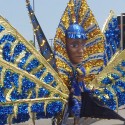Hair politics
Why are we all so obsessed with the locks of others?
Even when neo-soul singer India.Arie sang out last year that “I am not my hair,” it seems some people would disagree.
Late in the summer of 2007, Ashley Baker, then associate style editor at Glamour magazine, was invited to speak at a New York law firm on fashion ‘do’s and don’ts’ for women at the office. Among the first few slides was a black woman with an afro. Baker used this example to argue that afros and dreadlocks are a real no-no, “dreadful,” and that “these political hairstyles have got to go.” Her message was simple: natural black hair is unacceptable in the office and, from the tone of her presentation, unacceptable everywhere. Her warning went unappreciated, as many African- Americans and Canadians across North America later voiced outrage at her comments. The scandal resulted in Baker leaving her job at Glamour.
As many black women can attest, we’ve always been obsessed with our hair and have struggled over accepting our curls and naps for decades. And right along side, it seems everyone else has been obsessed with our hair, too.
Just last week, a stranger at the gym, while looking at my natural hair in confusion, asked me incredulously, “You don’t perm your hair?” Regardless of how you wear your hair, the stereotypes are limitless. Although she may do it for a number of reasons, a woman who straightens her hair (or wears a weave) is often read by family, friends and co-workers as willing to conform, or trying to act “white,” even though that is usually untrue.
Likewise, a woman who wears her hair natural is often stereotyped as radical, unkempt or unprofessional – once again, untrue.
Baker’s example serves to remind us that what we’ve done is limit ourselves by allowing our obsession with hair, or other peoples’ perception of our hair, to define us.
_______________________________________________________________________________________________________
More…
I LOVE MY HAIR! Sesame Street Represents for Little Black Girls Everywhere
Health Canada to put the brakes on the Brazilian Blowout
Ponytails: This Fall’s Hair Trend
How to Stay High and Fly Above the Depths of Debt Part 2 — Hair
_______________________________________________________________________________________________________
Black and white women alike, we’ve all unfairly boxed ourselves into a trap of constantly being judged based on what we’ve done — or haven’t done — to our tresses. Singer Jill Scott said it best, when referring to the cultural selfhatred of black women with their hair, she told Interview magazine: “We’re beautiful people and we’re in a state of crisis. We are. We don’t like each other. We don’t like ourselves.”
Getting rid of this fixation on our hair will not necessarily be easy, and it will probably get worse before it gets better. But it’s important to speak out against ignorant comments, and deconstruct why we continually try to stereotype each other.
We need to recognize the prejudices our own community has when it comes to hair; assumptions of women who wear their hair straight are just as dangerous as assumptions toward women who keep their hair natural. Whether you use a hot comb, lye, dye or grease this holiday season, do it because it makes you feel good, not because of those who decide to make your hair their business.
Wear your hair with pride, because regardless of what your hair looks like, everyone and anyone can benefit from giving themselves the gift of self-acceptance.
Tell us how you feel about your hair, leave a comment below.
Befriend Sway on Facebook
Sway with us on Twitter







Leave your response!